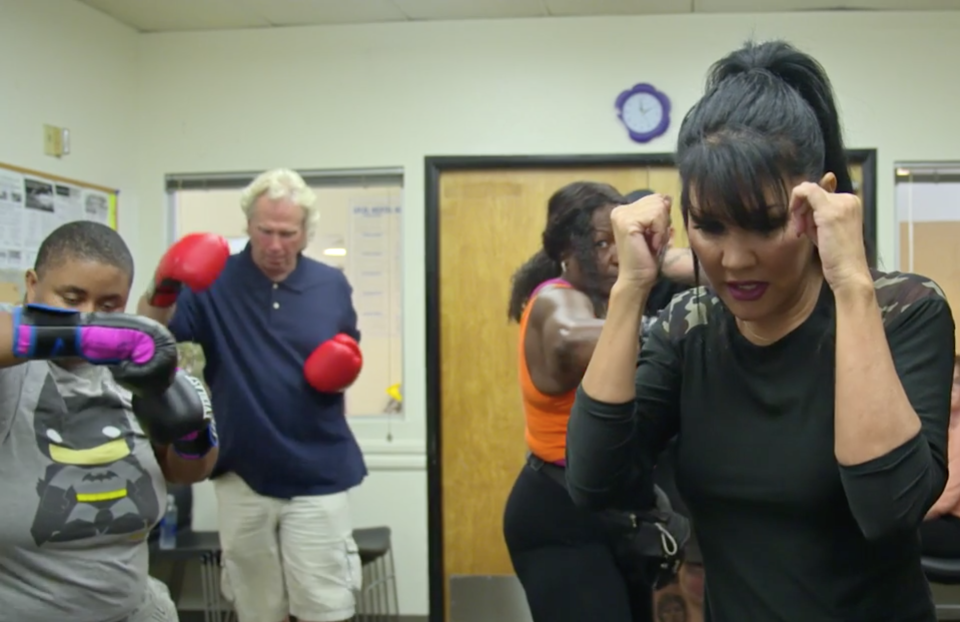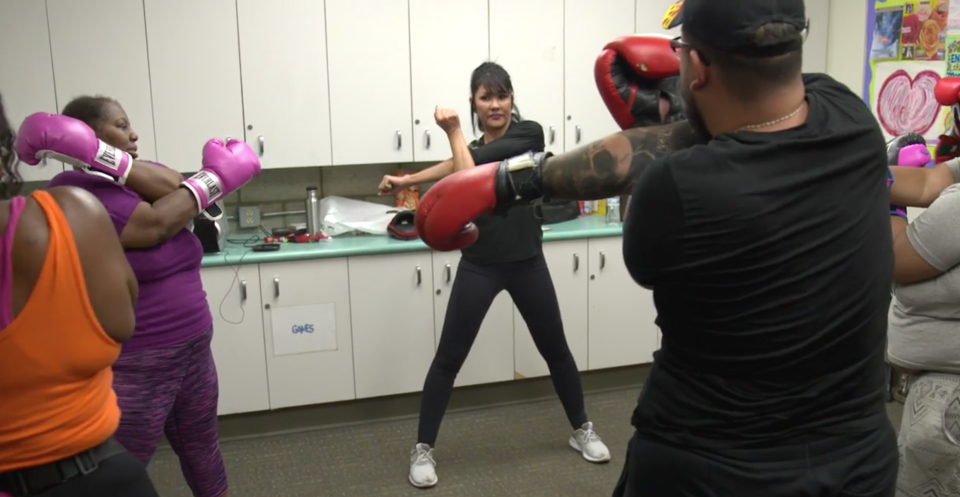Why helping the homeless means so much to former world champ Mia St. John
There was a time when it was the brand of car she drove that was important to Mia St. John. She loved Louis Vuitton purses and the things she could buy with the money she’d earned in a long and successful boxing career.
These days, St. John doesn’t care much for money, or what it can bring her. She’s happy to go to breakfast or lunch with a friend at Denny’s, to offer friendship, support and simply to just be there.
The former world champion boxer is now a staunch advocate for the homeless. But St. John, 50, doesn’t simply hand a few bills to panhandlers on the street corner whenever she passes by.
St. John makes it her business to make a difference in their lives.
She has a center in Palm Springs, California, that provides food and shelter for the homeless, no questions asked. She brings them in and feeds them, gives them a cup of coffee, perhaps a cigarette, and doesn’t worry about having them fill out forms that stacked together are as big as the Los Angeles telephone book.
“Every day, me and my employees are out on the streets where the homeless hang out,” St. John said. “We talk to them. We befriend them. We let them know we are there for them. ‘Come to our center and have a meal. Let’s have some coffee. We’ll get you a smoke.’ Whatever they like to do, we find something for them.”
Her work has led her to places that most people would never want to go, and put in her situations that would be terrifying to even the toughest person.

Her relationship with a formerly homeless man is an example of the risk she takes in order to affect positive change.
“I met Johnny because I was roaming the streets doing outreach, trying to find some of these people and to help them,” St. John said. “I see this guy I’ll call ‘Johnny’. He’s huge, a big guy, maybe 300 pounds of fat. He was naked and he jumped on the hood of my car saying he was going to kill me.”
St. John would have been within her rights to speed off and never lay eyes on Johnny again. Not only did she not flee, she turned off the car, got out and embraced the man.
Her friend warned her not to go near him. “He’s violent,” the woman told St. John.
But St. John went over and introduced herself.
“I grabbed him and hugged him and said, ‘I love you,’ ” she said. “I’ll admit, that’s tough because you don’t know where their head is at. But you know what? I have luck 100 percent of the time. I’m not encouraging people to do that, because I don’t know if they have the education or know-how, but this is what I’m committed to doing, to saving these people and helping them rebuild their lives.
“Johnny now has his own place. He’s clean shaven. He looks nice. He’s lost weight. He’s on his meds. He’s normal as can be. But when I tell people about how he was when I met him, they’re like, ‘No. Not that guy.’ And I’m like, ‘Yeah. We did it.’ That proves there is hope.”
********St. John has been a charitable person all of her life, something her mother, an immigrant from Mexico, instilled in her from a young age. A first-generation Mexican-American, she set up a foundation years ago that would give computers to schools in the barrios in Mexico.
“My parents went through a lot – a lot – to get me here and I feel like it’s my obligation to give back to the people of Mexico,” she said.
But her tireless advocacy on behalf of the homeless population grew out of a personal tragedy.
Her son, Julian St. John, was diagnosed as a schizophrenic as a teenager. Most schizophrenics are diagnosed between 16 and 30, and Julian needed round-the-clock care.
He was a handsome man, a strapping 6-foot-4 with a head of curly hair who became something of a renowned artist. At one point, prints of his works were selling for $3,000 apiece.
But because of his illness, Julian St. John spent a lot of time on the streets, homeless, begging for money so he could buy drugs.
“If you look at the statistics, you’ll learn that the majority of homeless people are mentally ill, like my son,” she said. “In a lot of cases, their families don’t even know where they are. I can tell you I spent countless days and nights searching for my child on Skid Row, on the streets of North Hollywood, Pacoima, wherever. I went to the ends of the Earth to find my son.
“When they have schizophrenia and they’re off their meds, they often get psychotic and disoriented. So they don’t really know where they’re at or what is happening to them. And that’s the homeless. Yes, there are homeless who become unemployed or have misfortunes. That is true. But the majority of them are like my son. They’re psychotic, they don’t have their meds and because they don’t, they start self-medicating by taking other drugs, which makes the problem even worse.”
Mia provided Julian round-the-clock care. Her schedule as a boxer gave her flexibility in being able to be there for Julian. She’d rouse him each morning and give him his medications. She’d pry open his mouth, put the pill in and make sure he swallowed it.

He had a severe case of schizophrenia and despite a pair of well-off parents who loved him and provided for him, he often would disappear for stretches at a time.
Mia St. John is an ex-world champion boxer who famously fought on the undercards of fighters like Floyd Mayweather, Oscar De La Hoya and Erik Morales in the late 1990s, gaining popularity at a time when women’s boxing was finally starting to garner attention.
Her ex-husband, Kristoff St. John, is an actor who has been on the soap opera, “The Young and the Restless,” for 30 years.
In 2016, voters in Los Angeles County approved Measure H, a quarter-cent tax hike that was designed to raise $259 million for housing for the homeless. St. John opposed the measure because she believes a more personal touch is required.
“L.A. just put [$259 million] into housing for the homeless, but excuse me, that [expletive] doesn’t work,” she said. “You know what? Since they passed that plan last year, homelessness has increased. And this is why: It’s not about housing. Listen, my son had two beautiful homes to choose from. He had his father, who has been acting since he was 6 years old and has been on the same show for 30 years. My son had everything and anything he could ever have wanted, cars, houses, whatever. How does a kid like that end up on Skid Row?
“This is how: My son had severe schizophrenia. It took me to get him up every morning to give him his meds. I took him and I’d say, ‘Son, open your mouth. Pull back your cheeks. Lift up your tongue,’ because I had to make sure he actually took it and wasn’t hiding it somewhere. … But all of this sometimes, you learn that it doesn’t matter. Sometimes the meds don’t work.”
On Nov. 23, 2014, Julian St. John took his life, leaving two heart-broken parents and a sister behind. But his mother was determined to make sure he didn’t die in vain.
If she couldn’t help save her son, by golly she told herself, she’d help save someone’s son. She had the time, the resources, the willingness and the education to do it. St. John earned a degree in psychology from Cal State Northridge.
“Everyone has good days and bad days, but the bad days are more dangerous when you’re schizophrenic,” she said. “On a bad day, he’d want to use and would think, ‘Well, Mom doesn’t let me use. There are no drugs in the house. She doesn’t allow drinking, either. So I’m going to hit the streets.’ And that’s what would happen, he’d hit the streets looking for drugs.
“Maybe he’d score and he’d get some meth or whatever. He’d then get on the meth, get disoriented, and he didn’t have his meds and he didn’t have me. He didn’t know where he was. He was on the street somewhere and the meth would run out and he’d start panhandling so he could get more. He’d then take more and more and was getting deeper and deeper into this.”
Everything she could think of, she did, but it was an often fruitless, frustrating task.
“I had missing signs all over the city of Los Angeles, saying, ‘Missing person, have you seen this child?’ ” she said. “I’d find my son and was laying down somewhere face down. I’d call to him and I didn’t know if he was dead or alive. He’d look up and say, ‘Mama. Mama.’ He was 90 pounds and disheveled. It was horrible. It was heart-breaking. But this is your child and he is in a bad spot and you would do anything to help your child. But the cycle just repeats, over and over.”
********

The art studio she created in Palm Springs for her son is now a homeless shelter. The center takes in people, no questions asked, and provides support, love, a hot meal and whatever else may be needed.
“If you are a human, you qualify,” she said of her shelter. “It’s free to the public. We won’t turn you away if you can’t fill out the six feet of paperwork other places require. We take in people in need and we provide assistance first and we worry about the logistics later.
She honors Julian by every day going out and doing what she can to make a difference in the lives of people that society often overlooks, and looks askance at.
“There was a stage of my life when material possessions were important to me,” she said. “I was charitable then, don’t get me wrong, but in a lot of ways, I was consumed by material things. When you find yourself in a situation like I was in with my son, it’s when you realize that those things aren’t important.
“These are human beings with emotions and feelings and families. So many of them have mental health issues and nobody wants to bother with them. But they deserve someone to be out there for them, letting them know that they are important and that not everyone has forgotten about them.”
More from Yahoo Sports:
• Miserable Giants fire coach, GM
• Report: Lakers now enforcing ‘LaVar Ball rule’
• Restaurant goes crazy when NFL star walks in
• Dan Wetzel: A needed fix for college football’s postseason


